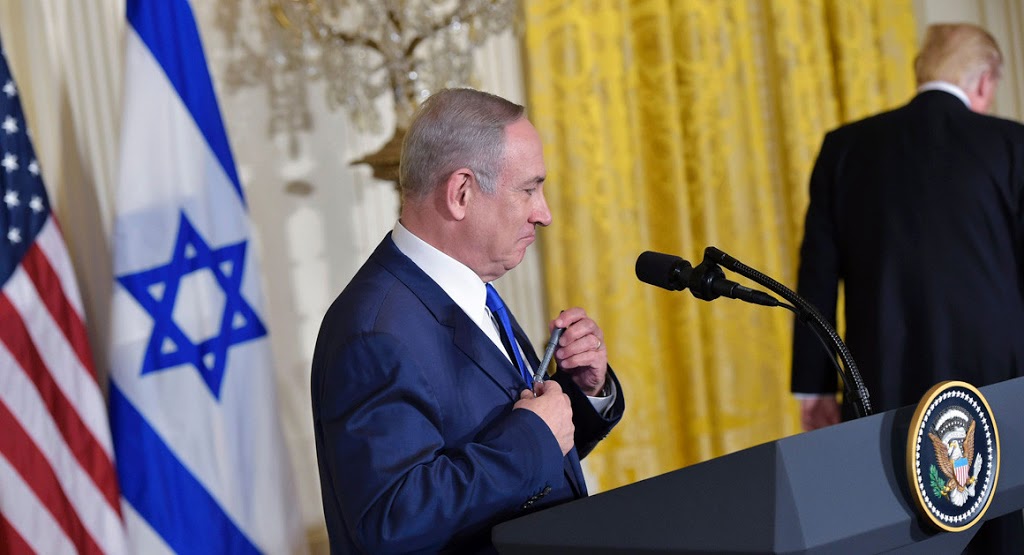Washington Post
Foreign leaders read polls, too. The dive in President Trump’s reelection prospects is prompting some to back away, in the quiet hope that they may soon be rid of him. Others are sprinting to take advantage of Trump’s willingness to cut deals or tolerate initiatives they know would be unacceptable to a President Joe Biden.
None are running faster than Benjamin Netanyahu — who, along with Vladimir Putin, has already been the biggest international beneficiary of the Trump administration. The Israeli prime minister is attempting to use Trump to carry out two of the boldest gambits he has attempted in a decade in power. One has been widely debated: his bid to annex up to 30 percent of the West Bank to Israel, nominally under the guise of Trump’s dormant Mideast peace plan.
The other is less visible but equally audacious and risky. In the past few weeks, Israel has apparently been conducting what amounts to a slow-motion, semi-covert military campaign against Iran’s nuclear and missile programs, and perhaps other industrial and infrastructure targets as well. Mysterious explosions and fires have struck a key centrifuge production facility, a military base where missiles are produced, as well as power plants, aluminum and chemical factories, and a medical clinic. Last week, a fire erupted at the port of Bushehr on the Persian Gulf, destroying seven ships.
The Netanyahu government may not have done all this damage: “Not every incident that transpires in Iran necessarily has something to do with us,” its defense minister coyly said earlier this month. But reporting by The Post and the New York Times pins the largest attacks, including that at the centrifuge facility, on Israel — and Middle East analysts I consulted don’t doubt it. “I’m surprised the Israelis have not been more circumspect about this,” said Dennis Ross, a former senior Mideast official in multiple administrations.
Ross and other analysts say Netanyahu almost certainly obtained Trump administration consent, if not collaboration, for the Israeli offensive, if only because the United States is a likely target for Iranian retaliation. So far, the regime of Ayatollah Ali Khamenei, which is struggling with multiple crises, has played down the attacks, attributing some of them to gas leaks or other accidents. But if it chooses to respond, its targets could include U.S. bases in Iraq or shipping in the Persian Gulf, both of which it has already struck in the past year.
A successful Iranian counterattack could force Trump into a military conflict ahead of the election, something that would be as likely to harm as help his apparently diminishing chances. Interestingly, the president’s aides appear to have slowed Netanyahu’s polarizing push for territorial annexation, at least for now, imposing conditions that he can’t easily meet — such as offering concessions to West Bank Palestinians.
Yet despite the risks, Trump appears to be all in on the Iran campaign. No doubt that’s partly because the president and his secretary of state, Mike Pompeo, are nearly as zealous as Netanyahu about destroying the Iranian regime. But it’s also because Trump’s “maximum pressure” campaign against Iran has ended up heightening rather than decreasing the threat it poses, while all but excluding remedies other than military action.
Rather than succumb to revolution or cave to Trump’s demands, Tehran has responded to mounting U.S. sanctions by ramping up its enrichment of uranium. According to United Nations inspectors, it has quintupled its stockpile since Trump’s 2018 withdrawal from the deal limiting Iranian nuclear capacity. It also started deploying a new generation of advanced centrifuges, which could have given it the capacity to produce a nuclear weapon in a matter of months; the accord Trump discarded had pushed the breakout time back to one year.
The result, said Philip Gordon, who oversaw Middle East affairs at the National Security Council under President Barack Obama, is that at this point, “the only way to slow the Iranian program is to blow it up.” Remarkably, the July 2 attack on the Natanz centrifuge facility appears to have come as close to doing that as may be possible. It destroyed a plant where the new centrifuges were being assembled. According to one expert assessment, that could set back the Iranian nuclear program by at least a year.
Yet even the most ingenious attacks are unlikely to stop Iran’s nuclear work, or even limit it to the extent the nuclear accord did. Too many Iranian facilities are buried underground. In that sense, Netanyahu’s campaign, even as it exploits Trump, may be anticipating a Biden administration. Biden has said he would seek to restore the nuclear accord, and, said Ross, the Israelis believe Iran will respond positively. “What the Israelis have seemingly done is create space for diplomacy if Biden comes in,” he said.
That is, if Netanyahu’s Trump-enabled offensive doesn’t plunge us into a war.
